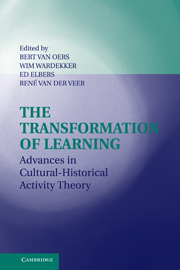Book contents
- Frontmatter
- Contents
- List of Contributors
- Preface
- INTRODUCTION
- SECTION ONE TENETS OF ACTIVITY THEORY
- Introduction to Section One: Exploring Vygotsky's Legacy: The Meaning of Mediation
- 2 Multiple Readings of Vygotsky
- 3 Exploring the Links between External and Internal Activity from a Cultural-Historical Perspective
- 4 Reflections on Points of Departure in the Development of Sociocultural and Activity Theory
- 5 Language in Cultural-Historical Perspective
- 6 The Formation Experiment in the Age of Hypermedia and Distance Learning
- 7 Constructivism and Meaning Construction
- 8 Subject, Subjectivity, and Development in Cultural-Historical Psychology
- SECTION TWO IDENTITY, DIVERSITY, AND INCLUSION
- SECTION THREE DYNAMICS OF ACTIVITY AND THE VARIATIONS OF LEARNING
- Index
- References
3 - Exploring the Links between External and Internal Activity from a Cultural-Historical Perspective
Published online by Cambridge University Press: 25 August 2009
- Frontmatter
- Contents
- List of Contributors
- Preface
- INTRODUCTION
- SECTION ONE TENETS OF ACTIVITY THEORY
- Introduction to Section One: Exploring Vygotsky's Legacy: The Meaning of Mediation
- 2 Multiple Readings of Vygotsky
- 3 Exploring the Links between External and Internal Activity from a Cultural-Historical Perspective
- 4 Reflections on Points of Departure in the Development of Sociocultural and Activity Theory
- 5 Language in Cultural-Historical Perspective
- 6 The Formation Experiment in the Age of Hypermedia and Distance Learning
- 7 Constructivism and Meaning Construction
- 8 Subject, Subjectivity, and Development in Cultural-Historical Psychology
- SECTION TWO IDENTITY, DIVERSITY, AND INCLUSION
- SECTION THREE DYNAMICS OF ACTIVITY AND THE VARIATIONS OF LEARNING
- Index
- References
Summary
After decades of being dominated by individualist (behaviorist, cognitivist, or physiology-driven) and reductionist notions, psychology has recently turned to contextual and cultural facets of human development. New attention to culture greatly contributes to, and necessitates, a substantial reconceptualization of the very nature of cognitive and other psychological processes as well as the ways to study them. Although the impact of culture, in one form or another, is acknowledged in almost all research branches that exist in psychology today, there is arguably one family of approaches that places this issue at the very center of its theory and methodology. This family of approaches encompasses studies in distributed cognition (e.g., Hutchins, 1996), situated learning (e.g., Lave & Wenger, 1991), cognitive evolution (e.g., Donald, 2001), sociocultural research (e.g., Cole, 1996; Wertsch, 1998), science and technology studies (e.g., Latour, 1999), and even history of psychology (e.g., Morawski, 2001). The principal assumption of this approach is that human cognition is a social collaborative activity that cannot be reduced either to physiological processes in the brain or to any individual information processing occurring “in the head.” Instead, cognition is viewed as stretching beyond the individual isolated mind – into the cultural systems of artifacts and activities that allow for the cognitive processes to be accomplished and into the social communities of which these processes are only a part.
Information
- Type
- Chapter
- Information
- The Transformation of LearningAdvances in Cultural-Historical Activity Theory, pp. 38 - 57Publisher: Cambridge University PressPrint publication year: 2008
References
Accessibility standard: Unknown
Why this information is here
This section outlines the accessibility features of this content - including support for screen readers, full keyboard navigation and high-contrast display options. This may not be relevant for you.Accessibility Information
- 9
- Cited by
